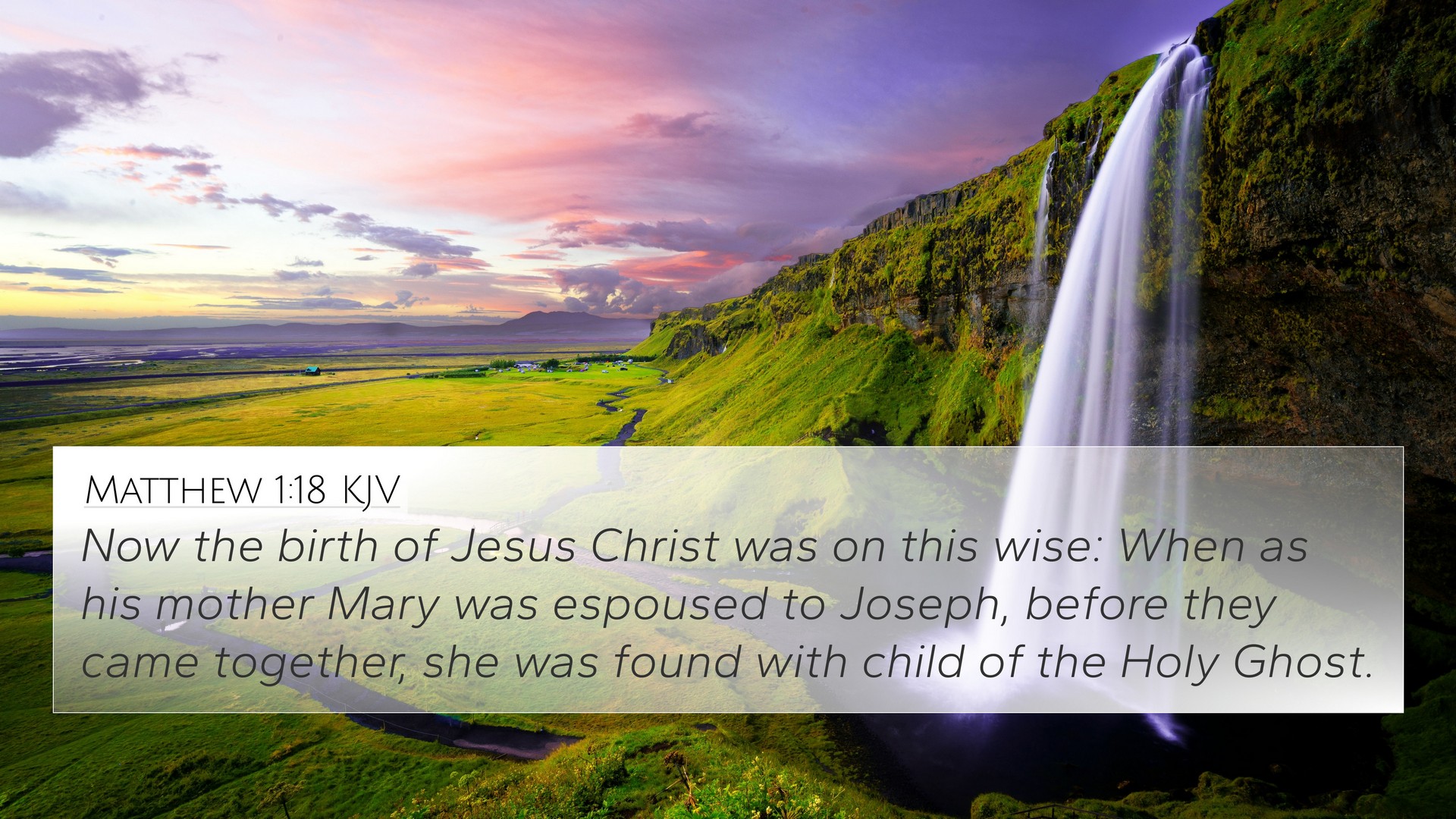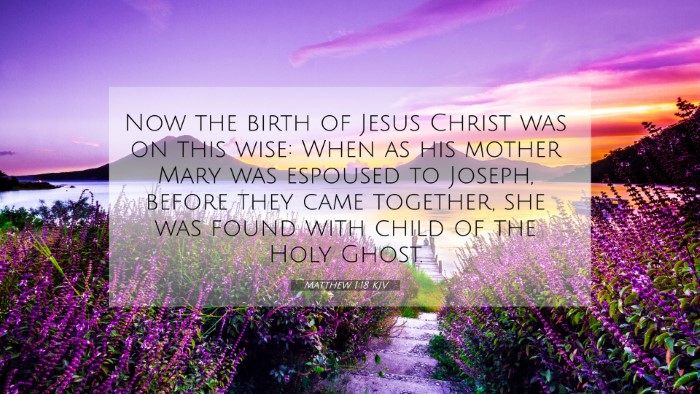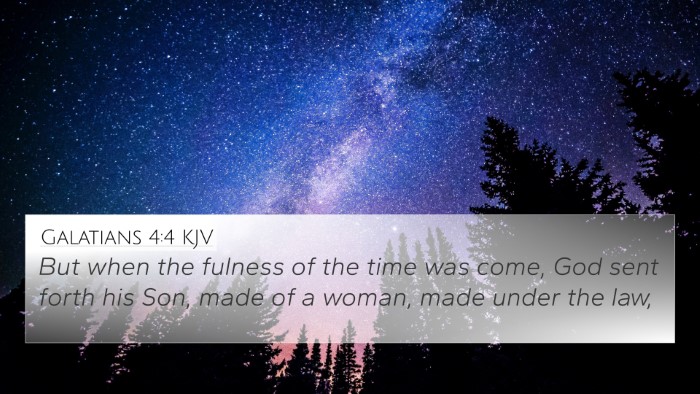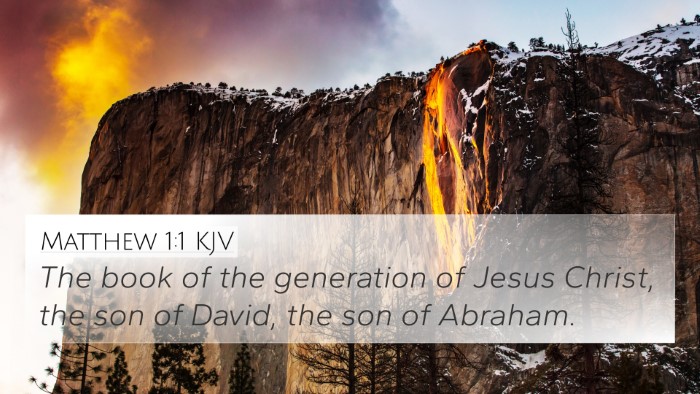Understanding Matthew 1:18
Verse: "Now the birth of Jesus Christ was on this wise: When as his mother Mary was espoused to Joseph, before they came together, she was found with child of the Holy Ghost." (Matthew 1:18 KJV)
Introduction
The verse begins the account of the birth of Jesus Christ, emphasizing the miraculous nature of His conception. This verse is pivotal in understanding both the identity of Jesus and the divine nature surrounding His birth.
Key Themes
- Divine Conception: The verse introduces the idea that Jesus was conceived by the Holy Spirit, underscoring His divine origin.
- Role of Mary: Mary’s active role as the mother of Jesus hints at the fulfillment of prophecies regarding the Messiah.
- Humanity of Jesus: Despite His divine conception, Jesus is also fully human, being born of Mary.
- Espousal of Mary and Joseph: Their betrothal status highlights the social and cultural context surrounding Jesus' birth.
Bible Cross-References
Matthew 1:18 connects with several important scriptures throughout the Bible:
- Isaiah 7:14: "Therefore the Lord Himself will give you a sign: The virgin will conceive and give birth to a son, and will call him Immanuel." This prophecy foretells the virgin birth.
- Luke 1:26-35: The Annunciation where the angel Gabriel informs Mary of her unique role as the mother of the Savior.
- John 1:14: "And the Word was made flesh, and dwelt among us..." affirms the incarnation of Christ.
- Genesis 3:15: The first promise of redemption points to the coming of the Messiah.
- Galatians 4:4: "But when the fullness of the time was come, God sent forth his Son, made of a woman..." emphasizes Jesus’ human birth.
- Matthew 1:20: "But while he thought on these things, behold, the angel of the Lord appeared unto him in a dream..." indicates the divine involvement in their lives.
- Romans 1:3: "Concerning his Son Jesus Christ our Lord, which was made of the seed of David according to the flesh..." connects Jesus’ lineage to David, highlighting His royal heritage.
- Micah 5:2: Prophecy about the birthplace of the Messiah, indicating specific fulfillment in Jesus’ life.
Commentary Insights
The following insights reflect a combination of thoughts from prominent public domain commentators, including Matthew Henry, Albert Barnes, and Adam Clarke:
Matthew Henry
Henry emphasizes the miraculous nature of Christ’s birth, noting that the Holy Spirit’s role indicates a heavenly intervention. He references the prophetic connections that made Mary’s experience so significant, as it fulfills old covenant promises.
Albert Barnes
Barnes points out the importance of the betrothal to Joseph, which reveals the societal implications of Mary’s pregnancy. He highlights that despite the earthly troubles that might arise, God’s plan for redemption through Jesus was unshakeable.
Adam Clarke
Clarke analyzes the meaning behind "found with child," suggesting that it implies Mary had not been unfaithful, aligning her conduct with her calling. He underscores the importance of the Holy Spirit's involvement as central to understanding Jesus' divine nature.
Conclusion
Matthew 1:18 serves as a crucial reference to the nature of Jesus Christ’s incarnation. It invites readers to explore broader themes of divine intervention and prophetic fulfillment. The connections between this and other Bible verses enhance our understanding of both the Old Testament anticipations and the New Testament fulfillment of God's promise of a Savior.
Tools for Further Study
For those interested in a more in-depth look at Scripture and the connections between verses, consider utilizing:
- Bible Concordance: Helps in finding specific words and their occurrences throughout the Scriptures.
- Bible Cross-Reference Guide: A tool for tracing themes or subjects across different passages.
- Cross-reference Bible Study: Methodologies for comparing connected scriptures to deepen understanding.
- Bible Reference Resources: Valuable for identifying thematic connections and supporting verses.
Inter-Biblical Dialogue
Engaging in inter-Biblical dialogue through these connections enriches one’s spiritual insight and comprehension of biblical narratives. This practice not only deepens personal faith but also equips believers for better understanding and sharing of the gospel message.











